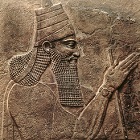


 |  | |
 |
The 8th Century BCE |
|
Greek alphabet (c.800– present Left-to-right) was derived from the earlier Phoenician alphabet, and was the earliest known alphabetic script to have distinct letters for vowels as well as consonants. |
780 The first historic solar eclipse is recorded in China. |
|
776 The first Olympic Games held in Olympia Greece. |
763 A solar eclipse on June 15 is used to fix the chronology of the Ancient Near East. Greek poet Hesiod c.750-c.650 who wrote mythology about the gods as well as farming and astronomy. |
|
745 The crown of Assyria is seized by Pul, who takes the name Tiglath-Pileser III. He will introduce numerous political and military reforms and more than double the lands under Assyrian control. |
|
 738 King Tiglath-Pileser III of Assyria invades Israel, forcing it to pay tribute. 732 Hoshea becomes the last king of Israel. |
|